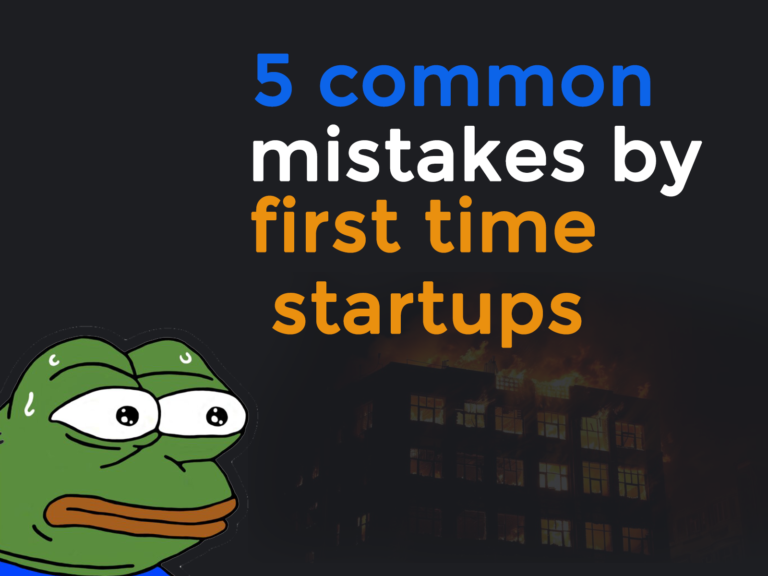📢 Now taking new project for September, book an intro call today 📲
5 Common Mistakes by First-Time Startup Founders to avoid 💼

Starting your own business is a bold and exciting journey. It comes with endless possibilities but also a significant amount of uncertainty. As a first-time founder, the road to success can seem exhilarating, yet filled with challenges. Every decision feels like a new beginning, but the lack of experience means mistakes are inevitable. While learning from mistakes is an important part of growth, it’s even better to avoid them where possible.
By looking at the 5 common mistakes by first-time startup founders, you can avoid some of the pitfalls that trap many new founders. Here are common errors and how you can sidestep them to increase your chances of success.
1. Hiring Full-Time Employees Before Achieving Product-Market Fit

One of the most significant mistakes new founders make is hiring full-time employees too early, especially before achieving product-market fit. Product-market fit is the point where your product resonates with a large number of people. In other words, you have something people genuinely love and are willing to pay for.
When you’re still trying to reach product-market fit, you’re going to be pivoting a lot. You might find yourself changing direction on a weekly basis, experimenting with different ideas to figure out what works best. This is the most crucial period for your startup, where flexibility and speed are key. However, full-time employees, particularly those who aren’t co-founders, may struggle to keep up with these constant changes. They might question whether all the uncertainty and the compensation sacrifices they’re making are worth it.
Hiring full-time employees during this stage not only puts financial pressure on your startup but also risks creating a team dynamic where people feel burned out or dissatisfied. Instead, try to keep your team lean at first. Stick with co-founders who are fully invested in the vision and can handle the rapid changes. Once you’ve achieved product-market fit, it becomes much safer and more sustainable to hire full-time employees.
2. Deprioritizing Offshore Talent

One of the most essential tasks for early-stage startups is managing cash flow efficiently. Labor is often the largest expense for any business, and first-time founders can save significant amounts of money by hiring offshore talent. However, many startup founders overlook this, choosing instead to hire local talent that might come with a heftier price tag.
The reality is that there’s high-quality talent available globally, especially in lower-affluence regions. Many of these individuals can offer the same skills and expertise as those from major business hubs but at a lower cost. With advancements in collaboration tools and remote work culture, it’s easier than ever to manage a remote team.
By tapping into offshore talent, startups can save money in the early stages without sacrificing quality. You can use platforms like Upwork, Fiverr, or LinkedIn to find freelancers or long-term remote workers. This strategy frees up capital that can be reinvested into other areas of the business, such as product development or marketing. Prioritizing cost-effective labor solutions early on can provide your startup with the runway it needs to succeed.
3. Holding on to the First Idea for Too Long

As a first-time founder, you’ve likely built your startup around what you think is a fantastic idea. Maybe you even left your job because you believed in this idea so much. However, one harsh reality of entrepreneurship is that your first idea is probably going to fail. This isn’t a discouragement; rather, it’s a part of the process.
Startups often succeed because of unique insights that no one else has, and those insights usually come through trial and error. They aren’t discovered through market research or surveys but through direct experience with failure. Iteration and rapid changes are essential for gaining the insights needed for long-term success.
Many founders make the mistake of clinging too tightly to their initial idea, even when it shows signs of not working. This attachment slows down the process of learning what will truly resonate with customers. Instead of sticking with a failing concept, be ready to pivot and experiment. The faster you iterate through ideas, the sooner you’ll land on one that has the potential to succeed. Don’t be afraid to let go of an idea that isn’t gaining traction—failure is a stepping stone toward innovation.
4. Building a Bigger MVP Than Necessary

Founders often have grand visions for their product and want to create a complete, polished version before launching. But building a larger Minimum Viable Product (MVP) than necessary is a common mistake. The purpose of an MVP is to create a simple, functional version of your product that allows you to test your assumptions quickly. It’s a way to get customer feedback with minimal investment in time and resources.
Some founders fall into the trap of overdeveloping their MVP. They want it to be perfect, with all the bells and whistles of a full-fledged product. But building out every feature can take months or even years, and by the time the product is ready, there’s no guarantee people will want to use it.
Instead of overcommitting to a complex MVP, try starting with something simple. Conduct a “fake-door” test where you create a landing page describing your product using no-code tools. Run ads on the page, and see how many people click or sign up for more information. This will give you a good indication of interest without requiring you to build the product. If people are interested, you can then begin developing your MVP with greater confidence.
The goal here is to test your ideas quickly and adjust based on real-world feedback, rather than sinking time and money into something that might not work. You can checkout this course on how to build a Minimum Viable Product
5. Not Having a Marketing Co-Founder

When it comes to scaling a startup, growth is everything. Investors typically look for startups that can achieve high growth, with targets of 10% month-over-month being common benchmarks. Achieving this level of growth requires constant experimentation with new marketing channels, strategies, and tactics.
For first-time founders, this is where not having a marketing co-founder can become a serious mistake. A marketing co-founder is crucial for maintaining a relentless focus on growth. They should be constantly testing and optimizing different ways to attract users and generate demand for your product.
Without a dedicated marketing co-founder, the burden of marketing often falls on other members of the team, who are already focused on product development, operations, or sales. This leads to divided attention and can slow down the marketing efforts.
Having someone who understands growth marketing from the inside out will allow your startup to develop the strategies needed to scale. Whether it’s social media, SEO, paid advertising, or partnerships, having a marketing-focused co-founder will ensure that your startup doesn’t miss out on the opportunities that drive exponential growth.
Conclusion
Every startup founder will make mistakes, especially during their first venture. However, by learning from others, you can avoid some of the most common traps. Hiring too early, ignoring offshore talent, holding on to the wrong idea for too long, overbuilding your MVP, and neglecting growth marketing are all common mistakes, but they’re also preventable.
By staying nimble, focusing on cash flow, and keeping a close eye on product-market fit, you’ll set your startup on a path toward greater success.
